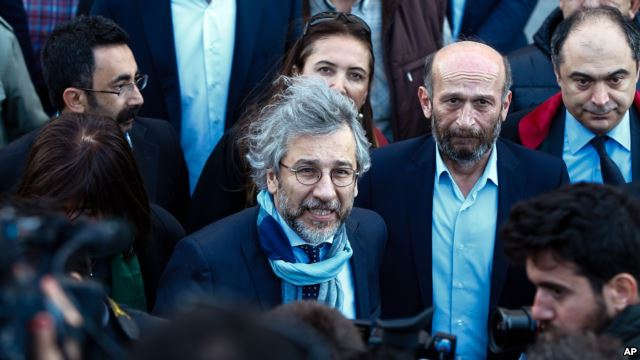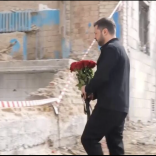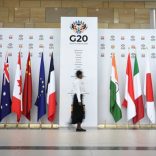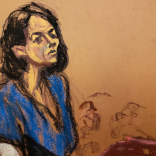Zelenskyy calls for more pressure on Russia after deadly missile strike in Ukrainian capital Kyiv
Turkish Journalists Face Life Imprisonment for Espionage

VOA / Can Dundar, the editor-in-chief of opposition newspaper Cumhuriyet, center-left, and Erdem Gul, the paper's Ankara representative, centre-right, speak to the media before the start of their trial in Istanbul, April 1, 2016.
The trial of two Turkish journalists resumed Friday in Istanbul, with the two defendants facing charges of espionage and aiding a terrorist organization for their reporting that alleged the government was smuggling arms to Syria.
The closed-door trial involves Cumhuriyet newspaper editor-in-chief Can Dundar and its Ankara representative Erdem Gul. They could face sentences of life imprisonment if found guilty.
A defiant Dundar said during the hearing that on trial in this case were not him and Gul, but “journalism, the right to obtain information and the right of society to have access to information.” Dundar said that the case represents a confrontation between journalists on the one hand, and President Recep Tayyip Erdogan and Turkish intelligence on the other.
“There is an error in the seating order (during the hearing). President and Turkish Intelligence versus journalists. We should have been the interrogators. They (referring to Erdogan and Turkish Intelligence) should have been the defendants, because an international crime is being tried. I think this seating order will be reversed soon and will be the way it should be. The ones who should be on trial are not us. Journalism, the right to obtain information and the right of society to have access to information, are on trial here. On the other hand, there is a crime that is trying to be hidden from the society,” Dundar said.
Dozens of supporters at the Istanbul courthouse chanted: “Free press cannot be silenced.” Others had their mouths taped over in an act of protest. Yet others were holding banners reading “Free press, Free society.”
Dundar and Gul are accused of publishing images dating back to January 2014 of Syria-bound trucks, which the newspaper said proved Turkey was smuggling arms into that country.
Case seen as test of press freedom
The Turkish Hurriyet Daily News reported Friday that a group of 473 lawyers filed requests to join the case as Dundar and Gul’s attorneys, and were granted permission to attend the hearing.
Rights groups insist the two have done nothing wrong by covering an issue of public interest and say the charges against Dundar and Gul should be dropped.
The case, which has generated international interest as a test of press freedom in Turkey, went to trial last Friday, but was adjourned until this week after opposition lawyers and politicians ignored the judge’s ruling to close the courtroom to the public.
President Erdogan has acknowledged that the trucks, which were stopped by Turkish gendarmerie and police officers while en route to the Syrian border, belonged to the intelligence agency and said they were carrying aid to Turkmens in Syria, fighting both President Bashar al-Assad and Islamic State militants.
Turkey has also alleged the reporters aided an Islamic movement headed by U.S.-based cleric Fethullah Gulen, an opponent of Erdogan.
U.S. President Barack Obama met Thursday with President Erdogan in Washington on the sidelines of Obama’s Nuclear Security Summit. Obama assured the Turkish leader of a continued U.S. commitment to Turkish security.
Separately Thursday, chaos erupted between Turkish security and protesters outside a Washington think tank, the Brookings Institute, where Erdogan was giving a speech.












Leave a Reply
Be the First to Comment!
You must be logged in to post a comment.
You must be logged in to post a comment.